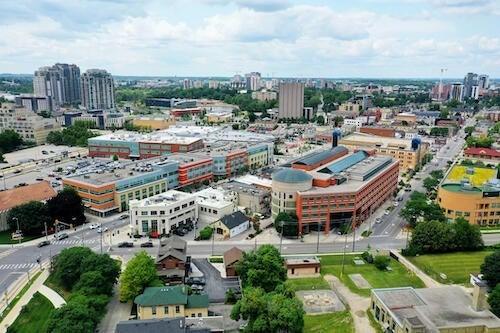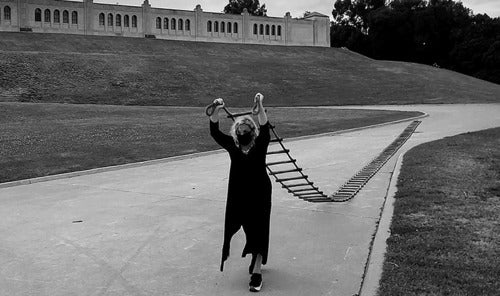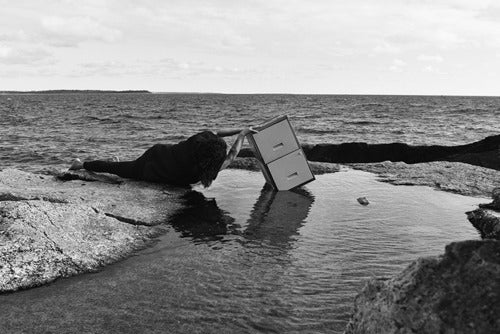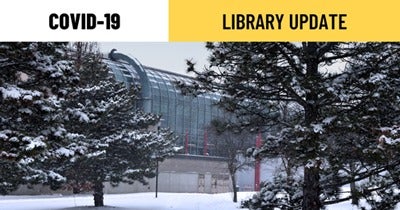Editor:
Brandon Sweet
University Communications
bulletin@uwaterloo.ca
Applied Public Health Chair in healthy environments for climate change and northern food security announced
This article was originally featured on the Water Institute's website.
Kelly Skinner, associate professor in the School of Public Health Sciences and Water Institute member, was appointed a Canadian Institutes of Health Research (CIHR) Applied Public Health Chair in Healthy environments for climate change and food security in northern Canada.
The prestigious position, one of only seven awarded, includes $1.15 million in funding over five years for highly focused research that improves health equity for citizens in Canada and around the world.
“By understanding climate change impacts and identifying local adaptations in the food systems of communities in northern Canada, we can better support the well-being and sustainability of communities, the environment, and land,” Skinner said.
Health Minister Jean-Yves Duclos and the CIHR announced a total of $10 million to increase public health research capacity in Canada. This investment includes $8 million for seven new Applied Public Health Chairs to carry out research programs in infectious diseases, urban and environmental health, and disease prevention, and $2 million for new research to address population and public health priorities.
Skinner’s research will capture the innovative entrepreneurship of community-led food initiatives in adapting to climate change to improve food security, northern food systems and environments, health equity, self-determination, well-being and overall health. The community-engaged research will be based around several case studies with communities in the Northwest Territories.
The vision for the Chair is to broadly learn from and enhance community capacity to address place-based priorities and inform both climate change and food security action and self-determined support-structures at local, regional and territorial scales. A key aspect of this Chair is working closely with decision-maker Dr. Jennifer Fresque-Baxter, several other knowledge users, and community partners to be able to see policy windows and share case study findings.
The research builds on and extends existing collaborations among stakeholders, including government, health institutions, provincial and community organizations, researchers, trainees and, most importantly, with Indigenous partners to support innovation and knowledge transfer, as well as advocacy for social justice of Indigenous food systems, cultural policies, and greater equity for Indigenous Peoples and northern communities.
“We recognize the vital importance of investing in public health research to better protect the health and safety of all Canadians. The recipients of these applied research chairs will work with public health leaders to design and implement new approaches to addressing the complex health challenges facing Canada and help build a healthier future for everyone,” Duclos said in the announcement.
Learn more about professor Skinner’s research.
Post-pandemic, urban planners are seeking a return to 'old normal' in downtown areas

City living has been radically changed by the spread of COVID-19. But planners of downtowns in mid-sized areas are more interested in returning those spaces to the way things were.
In a study led by researchers at the University of Waterloo, urban planners were asked to identify the attributes that contributed to the success of downtowns prior to the pandemic as well as the attributes that would facilitate their post-pandemic recovery.
While some urban scholars predict that recovery will lead to a “new normal,” the planners surveyed are primarily focused on restoring the “old normal.” This suggests that the planners are not preparing for any fundamental changes to past practices even in the face of changing reality.
“Despite calls for greater creativity and innovation, there is essentially no difference between what planners viewed as more important to downtowns pre-and-post the pandemic,” said Pierre Filion, an emeritus professor in the School of Planning at Waterloo. “There will not be any radical transformation of post-pandemic downtowns from the pre-pandemic downtowns of the early 21st century that would change the basic forms and functions.”
The findings show the ideal revived downtowns will exhibit many of the same functions in a distinctive built environment even with much attention being paid to the impact of the pandemic on the largest metropolitan areas. For instance, there will be increased use of outdoor and green spaces, more mixed-use development, particularly in residential areas; and transportation models friendly to walking and biking.
“Downtowns are likely to remain distinctive places within the cities, characterized by a mix of higher-density land uses, including specialized retail, office employment, and housing,” Filion said. “There will not be any radical transformation of post-pandemic downtowns from the pre-pandemic downtowns of the early 21st century that would change the basic forms and functions.”
The study identified government as an obstacle to the successful revitalization of mid-sized downtowns. However, many of the proposed recovery policies require government intervention, especially in public-private partnerships and collaborations where there is no single organizational structure that is appropriate.
Even with the increased government funding, the researchers noted it will be impossible to sustain the required levels of public investment in the revitalization of mid-sized downtowns in view of reduced government revenues in the long run.
The study, Planning for Post-pandemic Downtowns of Mid-size Urban Areas, was recently published in the journal of Planning Practice & Research.
UWAG reopens gallery with two exhibits on February 9
The University of Waterloo Art Gallery will be open to visitors with proof of vaccination beginning February 9, Wednesdays to Friday from 12 noon to 5:00 p.m. with a limit of 5 visitors at a time.
Exhibition documentation will posted on the UWAG website.

VESSNA PERUNOVICH
Here. In Absence
Here. In Absence is informed by the unsettling disposition of the world we live in and our collective experience over the last two years of pandemic. Echoing various crises in society today, the works in the exhibition evoke a reflective space for contemplation and connection around themes of isolation, division and belonging, expanding on concerns at the heart of Perunovich’s practice: boundaries, displacement and migration.
I am Still. Traveling anchors the viewer to a place that is neither foreign nor familiar. Filmed in 2020 at the R.C. Harris Water Treatment Plant beside Lake Ontario, the video depicts the artist walking around this seemingly abandoned environment dragging the burden of a nautical Jacob’s ladder. An ethereal soundscape composed around the industrial sound of a locomotive underlines the Sisyphean task the artist is engaged in, and suggests places elsewhere.
Reversed Code is informed by messaging codes such as Braille, an alphabet for the visually impaired; binary code used for computing and patterns in weaving; and ethical codes of conduct such as the United Nation’s Universal Declaration of Rights and Freedoms. The ten screens that make up the installation strike a poetic balance between darkness and light, beauty and violation. The work invites us to contemplate the precarious role of language and communication in a world that feels increasingly confusing and isolating.
Both works are being exhibited in North America for the first time. The exhibition is generously supported by production grants from The Canada Council for the Arts, Ontario Arts Council and Toronto Arts Council.
Vessna Perunovich is a Toronto-based interdisciplinary artist whose work embraces performance, video, sculpture, painting and drawing, to address issues around home, displacement and boundaries. Her work was included as part of So-Called Reality, Risk Change Project, National Gallery of Montenegro (2020); and Ad Infinitum, part of the 13thHavana Biennial, Cuba (2019). Recent solo exhibitions include “Fragments of a Whole” at the Contemporary Art Gallery Pancevo, Serbia (2021) and "Shifting Shelter" at Illingworth Kerr Gallery, Alberta University of the Arts, Calgary (2019). She has exhibited as part of international biennials in Cuba, Albania, England, Venice, Portugal, Yugoslavia and Greece, and attended residencies in Banff, Berlin, Bursa and Istanbul, New York, Beijing and Malta. Her survey exhibitions Borderless and Emblems of Enigma toured to galleries and museums across Canada and Europe. She is the recipient of a Chalmers Fellowship Grant (2019) and has been awarded grants by The Canada Council for the Arts, Ontario Arts Council and Toronto Arts Council.
UWAG is inviting members of the University community to a conversation with Vessna Perunovich and artist, curator and art historian Bojana Videkanic on Thursday February 10 at 7:00 p.m. You can register via Eventbrite.

RAVEN DAVIS
Mmenwenmad | To Save for Later
Mmenwenmad | To Save for Later is a new body of work by Raven Davis rooted in acknowledging the physical body, and lived experience as an incalculable, unwritten document. Davis’ monochromatic images capture the artist on the coastline of Mi’kma’ki, also known as the Atlantic coast. Through movement, sound, and the juxtaposition to land, body, Davis engages with a common archiving two-drawer filing cabinet that is incapable of archiving the continuum of one's lived experience or intimate relationships with the land. Exploring transgenerational epigenetic matrilineal inheritance, Davis embodies a personal choreography that expresses the impacts of colonialism, trauma, disability, transness, diaspora, and relationship to the land. In doing so, Davis draws on their previous body of works with monuments, creating temporary tributes honouring the water, land, sky world. Questioning, what has been deemed “worthy” of saving, what has been lost, and what has been intentionally left out.
Raven Davis is an Anishinaabe, 2-Spirit, transgender, disabled multidisciplinary artist, activist, and educator whose mother is from Treaty Four in Manitoba. Davis was born and raised in Michi Saagig Territory/Toronto, Ontario, and resides and works fluidly between Toronto and Kjipuktuk/Halifax. A parent of three sons, Davis works within the mediums of painting, performance, and media. Challenging systemic oppression, Davis fuses narratives of colonization, race, gender, disability, transformative justice, and 2-Spirit/Indigiqueer identity in their work. Davis’ performance and art practice bravely embodies their lived experience, reclaiming histories of Indigenous peoples’ restoring cultural knowledge, and honouring land, water and collective kinship futures.
This exhibition is an extension of the CAFKA.21 biennial, Everything Not Saved Will Be Lost. CAFKA would like to acknowledge the generous support of the Canada Council for the Arts.
Winter weather closings and other notes
You may not have been able to see it through the steady snowfall yesterday, but the University of Waterloo's main campus closed at 6:00 p.m. on Wednesday due to the deteriorating weather situation and concerns for the safety of people walking, biking or driving on campus. I'm told this closure affected a single evening class, but other on-campus activities were similarly curtailed.
Today, the University's campuses are open, but Bright Starts Co-operative Early Learning Centre is closed due to inclement weather.

The Library has announced that it will be expanding in-person services and hours starting Monday, February 7 as the University welcomes students back to campus, including the re-opening of its book stacks.
More details about specific services and access to the Library's collections is available on the Library's website: https://bit.ly/ServiceUpdateFeb7.
Link of the day
Anything he could do she could do better: Ms. Pac-Man hit arcades 40 years ago
When and Where to get support
Students can visit the Student Success Office online for supports including academic development, international student resources, immigration consulting, leadership development, exchange and study abroad, and opportunities to get involved.
Instructors looking for targeted support for developing online components for blended learning courses, transitioning remote to fully online courses, revising current online courses, and more please visit Agile Development | Centre for Extended Learning | University of Waterloo (uwaterloo.ca).
Instructors can visit the Keep Learning website to get support on adapting their teaching and learning plans for an online environment.
Course templates are available within your course in LEARN to help you build and edit your content and assignment pages quickly.
The following workshops, webinars, and events are offered by the KL team (CTE, CEL, ITMS, LIB):
- Independent Remote Course Design Essentials, self-directed, continuous self-enrollment course in LEARN.
- Independent Blended Course Design (iBlend), self-directed, ongoing
- Copyright Overview for Waterloo Instructors and Staff - self-directed, continuous self-enrollment course in LEARN.
Employees can access resources to help them work remotely, including managing University records and privacy of personal information. Here are some tips for staying healthy while working from home.
The Writing and Communication Centre has virtual services and programs to help undergrads, grad students, postdocs and faculty members with academic writing.
- Meet with writing advisors in one-to-one appointments to brainstorm, draft, revise, and polish. No time for an appointment? Try email tutoring for undergrads.
- Beat isolation and make writing progress at weekly Virtual Writing Cafés for grad students and faculty or PJ-Friendly Writing Groups for Undergrads.
- Take an online workshop or apply to our popular Dissertation Boot Camp program.
- Faculty can request custom in-class workshops for their courses, or the WCC can facilitate any existing workshops for student groups.
- Course-integrated support available. Attention faculty and instructors: The application form for Writing and Communication Centre course-integrated support is now available online. We offer five unique support streams for your courses including synchronous and asynchronous workshops and monitored discussion boards.
Co-op students can get help finding a job and find supports to successfully work remotely, develop new skills, access wellness and career information, and contact a co-op or career advisor.
The Centre for Career Action (CCA) is currently offering virtual services only. Questions about CCA's services? Live chat or call 519-888-4047 between 8:30 a.m. and 4:30 p.m. EST, Monday to Friday.
Drop-in to Warrior Virtual Study Halls on Wednesdays from 5:30 p.m. to 7:00 p.m. Come together in this virtual space to set goals and work independently or in groups each week.
Renison's English Language Institute continues to offer virtual events and workshops to help students practice their English language skills.
If you feel overwhelmed or anxious and need to talk to somebody, please contact the University’s Campus Wellness services, either Health Services or Counselling Services. You can also contact the University's Centre for Mental Health Research and Treatment. Good2Talk is a post-secondary student helpline available to all students.
The Library will continue to focus on digital resources and consultations as we start winter term with classes primarily online, though spaces will be open for drop-in individual study space, bookable individual study rooms, drop-in access to computers and printers, book pick-up services and IST Help Desk support. Special Collections & Archives and the Geospatial Centre will be accessible by appointment. Full details on current services and hours are available on the Library’s COVID-19 Update webpage.
The Faculty Association of the University of Waterloo (FAUW) continues to advocate for its members. Check out the FAUW blog for more information.
The University of Waterloo Staff Association (UWSA) continues to advocate for its members. Check out the UWSA blog for more information.
The Sexual Violence Prevention and Response Office (SVPRO) supports all members of the University of Waterloo campus community who have experienced, or been impacted, by sexual violence. This includes all students, staff, faculty and visitors on the main campus, the satellite campuses, and at the affiliated and federated Waterloo Institutes and Colleges. For support, email: svpro@uwaterloo.ca or visit the SVPRO website.
The Office of Indigenous Relations is a central hub that provides guidance, support, and resources to all Indigenous and non-Indigenous campus community members and oversees the University's Indigenization strategy.
The Waterloo Indigenous Student Centre, based at St. Paul’s University College, provides support and resources for Indigenous students, and educational outreach programs for the broader community, including lectures, and events.
WUSA supports for students:
Peer support - MATES, Glow Centre, RAISE, Women’s Centre - Visit https://wusa.ca/peersupport to book an appointment either in person or online for the Fall term.
Food Support Service food hampers are currently available from the Turnkey Desk 24/7 in the Student Life Centre. Drop off locations are also open again in SLC, DC, DP, SCH and all residences.
Co-op Connection all available online. Check https://wusa.ca for more details.
Centre for Academic Policy Support - CAPS is here to assist Waterloo undergraduates throughout their experience in navigating academic policy in the instances of filing petitions, grievances and appeals. Please contact them at caps@wusa.ca. More information is available.
WUSA Student Legal Protection Program- Seeking legal counsel can be intimidating, especially if it’s your first time facing a legal issue. The legal assistance helpline provides quick access to legal advice in any area of law, including criminal. Just call 1-833-202-4571.
Empower Me is a confidential mental health and wellness service that connects students with qualified counsellors 24/7. They can be reached at 1-833-628-5589.
GSA-UW supports for graduate students:
The Graduate Student Association (GSA-UW) supports students’ academic and social experience and promotes their well-being.
Advising and Support - The GSA advises graduate students experiencing challenges and can help with navigating university policies & filing a grievance, appeal, or petition.
Mental Health covered by the Health Plan - The GSA Health Plan now has an 80% coverage rate (up to $800/year) for Mental Health Practitioners. Your plan includes coverage for psychologists, registered social workers, psychotherapists, and clinical counselors.
Dental Care - The GSA Dental Plan covers 60 per cent to 70 per cent of your dental costs and by visiting dental professionals who are members of the Studentcare Networks, you can receive an additional 20 per cent to 30 per cent coverage.
Student Legal Protection Program - Your GSA fees give you access to unlimited legal advice, accessible via a toll-free helpline: +1-833-202-4571. This advice covers topics including housing disputes, employment disputes, and disputes with an academic institution.
The Graduate House: Open Monday to Friday 11:30 a.m. to 6:00 p.m. - We’re open to all students, faculty, staff, and community members. The Graduate House is a community space run by the GSA-UW. Capacity is limited to 50 per cent, and Government ID and Vaccination Records will be required for all dine-in guests. Graduate students who paid their fees can still get discounts and free coffee.
When and Where (but mostly when)
Warriors vs. Laurier Blood Donation Battle. Join our “Waterloo Warriors” team on the Blood.ca website or app. #ItsInYouToGive
Healthy Warriors at Home, free online programs including Nutrition Guides, Personal Training Consults, Health Webinars, Mindfulness Courses and On-demand Fitness. Sign up now.
Ujima Black History Month: opening and celebration, Thursday, February 3, 12 noon.
Master of Taxation, Virtual Information Session, Friday, February 4, 9:00 a.m. Learn more about the MTax advantage. To register visit www.mtax.ca.
OHD 2022 Speaker Series kicks off with Dr. Michelle R. Weise, “Tapping into the Lifelong Learning Market”, Tuesday, February 8, 10:30 a.m. Register now on Portal.
NEW - Master of Taxation, Virtual Information Session, Saturday, February 12, 9:00 a.m. Learn more about the MTax advantage. To register visit www.mtax.ca.